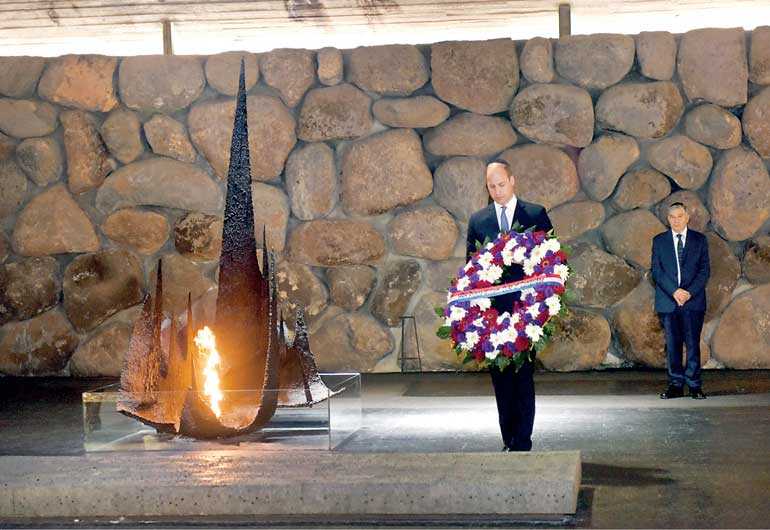Wednesday Feb 25, 2026
Wednesday Feb 25, 2026
Wednesday, 27 June 2018 00:00 - - {{hitsCtrl.values.hits}}

Britain’s Prince William lays a wreath during a ceremony commemorating the six million Jews killed by the Nazis in the Holocaust, in the Hall of Remembrance at Yad Vashem World Holocaust Remembrance Center in Jerusalem, 26 June 2018
JERUSALEM (Reuters): Britain’s Prince William voiced horror over a Nazi death camp exhibit at Israel’s Holocaust memorial in a sombre start on Tuesday to the first official British royal visit to Israel and the Palestinian Territories.
Wearing a black Jewish skullcap, William, second in line to the throne, laid a wreath in the Hall of Remembrance at the Yad Vashem memorial, where an eternal flame flickers and the names of extermination and concentration camps are engraved in the floor.
“Terrifying,” William said, viewing a display at the memorial’s museum of shoes taken by the Nazis from Jews at Majdanek death camp. “(I’m) trying to comprehend the scale.”
Tens of thousands of Jews and other victims were killed at the camp, near Lublin in what is now Poland.
After the tour, the prince was greeted by Prime Minister Benjamin Netanyahu and his wife, Sara, at their official residence in Jerusalem against the backdrop of the British and the Israeli flags.
“Welcome to Israel, a great historic visit. The whole people of Israel are excited,” Netanyahu told William, in a recording issued by the prime minister’s office.
At a meeting with Israeli President Reuven Rivlin, the prince, on a visit described by Britain as non-political, said he hoped “peace in the area can be achieved”. Israeli-Palestinian peace talks collapsed in 2014.
During the four-day visit, William is also scheduled to meet Palestinian President Mahmoud Abbas and Palestinian youngsters in the occupied West Bank.
At Yad Vashem, William signed a guest book in which he noted with pride that his great-grandmother, Princess Alice, had been honoured by the institution as one of “the righteous among the nations” for sheltering Jews in her home in Greece during the Holocaust.
“I had a very moving tour around Yad Vashem this morning, which really taught me quite a lot more than I thought I already knew about the true horrors of what happened to the Jews over the war,” William said at the meeting with Rivlin.
He also spoke with two men who survived the Nazi genocide through British intervention.
Henry Foner, 86, and Paul Alexander, 80, were among thousands of Jewish children taken in by Britain as part of the 1930s “Kindertransport” from a continental Europe that was falling to German conquest.
“I said to his Royal Highness that this is a unique opportunity for me to express my thanks to the British people for opening their homes to me and to the other 10,000 children who came,” Alexander said.
“And I said that this is the message I think that one should learn from the children transport, that countries and people should open their doors to other people in distress escaping from persecution.”
Britain captured Palestine from the Ottoman empire in 1917 during World War One and administered the territory under international mandate until 1948, pulling out a day before Israel declared independence.
The trip is at the behest of the British government. Until now it had been British policy not to make an official royal visit until the Israeli-Palestinian conflict was resolved.